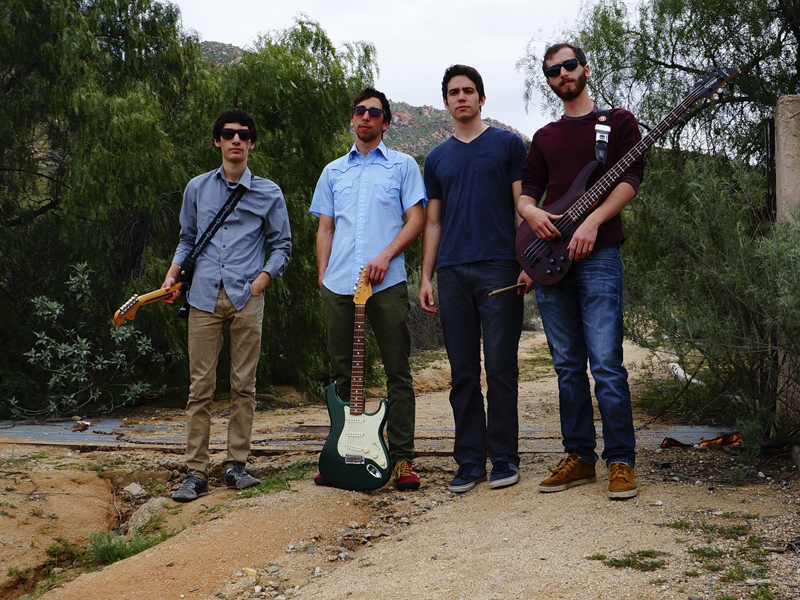
According to Webster’s dictionary, the word Pococurante is defined as indifferent or nonchalant. UC Riverside student band Pococurante is apathetic in name only, however. The musically ardent and inventive group—which consists of seniors Hovig Sarkissian, Eric Hyman, Stephen Fong and Nate Guze—has been producing music together since its formation in 2010.
I have seen Pococurante play a few house shows and at the Barn. The psychedelic rock band has a following from not only friends but also admirers who nod their heads to the band’s ambient garage-rock rhythms that support lead vocalist Stephen Fong’s lyrics. Influenced from an array of experimental rock bands, Pococurante, at times, takes on the sounds of Radiohead, the Red Hot Chili Peppers and Deerhunter, to name a few. Pococurante and I talked about the band’s time at UC Riverside as the year is coming to an end. And in the midst of the conversation, they also answered the question: What is the next step for Pococurante?
Matthew Ward: What were you doing musically (or not musically) pre-Poco? Did you ever think you would be musically involved or in a band at UCR?
Hovig Sarkissian (Lead Guitar): When I moved into A.I. [Aberdeen-Inverness], I immediately wanted to start a band.
Eric Hyman (Drums): I taught myself drums in high school and never stopped learning.
I was involved in the UCR Orchestra my freshman year. During that time I had met Stephen through an art history class and we started jamming with his electric drum set and guitar. We wanted to write a Zombie Opera that took place in Chinatown, San Francisco, so we practiced in the piano room in A.I. and started fooling around with guitar riffs. Never thought that I would get to the level I am now musically, ever. I’m super blessed to be able to do what I’m doing with these dudes.
Stephen Fong (Lead Vocals/Guitar): When I first got to A.I. I knew I wanted to start a band, but it was hard because there was no space for a drum kit and I didn’t know anyone with a kit either. That’s when I got some gear where I could compose my own songs using logic and a MIDI keyboard. I met Eric my first quarter and we started making songs on the piano together, and I was also getting my toes wet with producing for my other group Ghostcat. Eric and I originally wanted to make a zombie rock opera. I still have those sketches somewhere on my computer. Before I came to UCR I was the vocalist/rhythm guitar player for a band called Rip Van Winkle and the Water Babies which was made up of me and bunch of buddies from my high school jazz band.
Nate Guze (Bass): In my high school years, I was in a band called Northern Lights. It was pretty much just a few of my friends and I messing around with guitars, drums and bass. I joined Burgundy Skies when I first got to UCR and we played together and around campus for about two years before most of them split due to graduation—it’s a bitch, ain’t it? As [a] music major I was required to join school ensembles so I had a brief stint with Collegium Musicum before joining the UCR Jazz Ensemble, which I’m still in.
MW: How did the band first meet and end up working together? How did the addition of Nate come along?
HS: I met Stephen through a friend and eventually found out he lived in the same apartment complex as me. I joined in with his duo he formed with Eric on drums and Stephen on bass and we all jammed and eventually did our first few performances not too long after on campus.
EH: The addition of Nate came when we bought our PA [public-address] system. Nate started jamming with us and the chemistry was awesome. After a few practices together he decided to help throw down $200 for the band to get a PA / mixer and everything.
SF: First I met Eric during office hours in the only class we’ve had together, which was about Pre-Columbian architecture. We jammed together in the piano rooms and made little songs. The next year I had an electric drum kit and would jam with Eric in my apartment. Hovig lived in the same complex and was introduced through our mutual friend Mario. I actually jammed with just Hovig first and was pretty blown away and I remember telling Eric, “You’ve got to hear this guy play, man.” We played as a trio for the rest of the year, going on to win Battle of the Bands. The next year I met Nate in jazz band and he came to jam with us on bass and I moved over to guitar. This was a big help for me because I had trouble holding down the bass lines and singing vocals.
NG: I met Stephen first in the UCR Jazz Ensemble. He invited me over to jam with his trio a few times after I told him I was interested in playing with them [laughs]. I guess I kinda did buy my way into the band with chipping in for the PA system, but I could sense the talent and potential in the group so I had to find a way to stay.
MW: Proudest moments for the band? Favorite shows played?
HS: The Barn show we had was in my opinion where the money was at—literally because we made the most money with that show [laughs]. But the energy and work we put into the band really shined bright that night as we had our caring fans and close friends to cheer us on. I also got really drunk before and might have blacked out in many if not all of my solos. Not to mention my biggest influence Omar Rodriguez Lopez would be playing on the same stage a few weeks later.
EH: Any show where any of us end up bleeding from raging on our instruments so hard.
SF: I think my proudest moments in the band were during shows—notably the Bell Tower shows and the Barn show. Being in a band like ours takes a lot of hard work to sound good and the process surrounding that, getting together, going over parts, scheduling, agreeing on what works and what doesn’t can really test your patience and have you question why you’re doing this. But always when we play the shows and a song ends and then you hear a bunch of people screaming or even singing back some of the words you feel validated and you know it was worth the effort. Performance is really important because of that; you give your whole heart to something and then you get something back from the fans. That’s a very proud moment you know?
NG: So many awesome moments, it’s hard to decide. The Barn show was definitely a fun one. We all went crazy there and had an awesome time. Another good moment was at the Riverside Musical Arts Showcase. We were on our last song (“6/4”) and we were all doing amazing solos—especially Hovig. Damn, boy—when the cops came to bust up the show. Joke was on them, though, because we had just finished our set to tons of cheering fans that didn’t give a shit about the cops (including us). That was one of the best crowds we ever played for.
MW: Where do you see the band going? What direction do you want it to go?
HS: [It’s] hard to tell the future. We are all close friends with very different musical tastes, ideals and songwriting techniques. But it’s a lot of frustration and hard work to keep things in check, so it’s hard to tell how long we will be able to maintain things and keep reinventing ourselves. We are about to record our first EP and are focusing on that right now and also everyone is busy about to graduate.
EH: I’ve always seen this band as a college project; never really thought too far into the future. Honestly, I don’t think any of us know what we’re doing next week let alone what we do after graduation, but I would like to think even when we’re 30 years old we’ll still remember our songs and jam out.
SF: Like the guys said: We’re all in our last year of college. So we’re focused on getting this piece of paper called a degree first. Eric is right. I don’t know what I’m doing next week [laughs]. I think the course of the band is heavily dictated by how we conduct ourselves now. The main focus is to get this EP out and into the world. That could change a lot of things for us and the band dynamic. If I’ve learned anything about this band is that it’s a whole phenomenon of it’s own; I’m learning more and more to just let it do it’s thing because it’s bigger than any one of us as individuals. I love all these guys and I’d love to continue to make music with them into the future.
NG: Every band I join, I join in for the long haul. I’d love to see this band go places because we definitely have the talent, but I guess we’ll see what happens … Regardless of what happens I know we’ll still play. This band can make it for sure; we just gotta get that EP out!
MW: How does music itself affect writing lyrics and vice versa?
HS: In this band we mostly always have instrumentals first and then Stephen adds in lyrics. I am very shy and quiet and mostly prefer instrumentals because sound through my guitar is my true voice. Some of our songs are written and meant to be instrumental. But we try to balance things out with more lyrics.
EH: I’ve never written a single lyric in my life. My job is easy: just write the beat.
SF: In the early days we would jam and string parts together to make a song and then I would add lyrics later, for example the song “Tightrope”. Now we do that to an extent, but it mostly consists of the guys bringing a song or idea to the table and dealing out the parts. Hovig usually brings in a piece and we’ll jam off that and expand. I tend to bring in already complete songs, which to be honest doesn’t give the other guys a lot of room to add to the song so I’m trying to work on bringing stuff that can be more collaborative
NG: I do it similarly to the way that Hovig said: The instrumentals come first. I may have an idea for what the lyrics should be about when writing the instrumentals, but I get around to those after all is said and done. Most of our songs lyrics are written by Stephanovich, though.
MW: Who makes up the band’s biggest following? What’s the groupie situation?
HS: Mostly all the close friends we’ve acquired and spent our fun college years with living, eating, jamming, studying and partying with. Shout out to Sugarloaf and Liz and company.
EH: I would say that the biggest contribution to the band is how chill my roommates have been about letting Poco blast noise every week.
SF: As the other guys said, pretty much the regular Sugarloaf family, which was seven guys, but really more like 50 people because that house was always filled with friends and pets. We have a flag in our apartment now that was signed by all our friends from Sugarloaf.
NG: The Esquires and Gentile-Ladies of Sugarloaf Manor are our biggest supporters by far. We always have a crowd of regulars which include girlfriends (Chelsea!) and friends of friends. It’s mostly a group of seniors/juniors and those with band relations or people in the music department who dig us. This music is for everyone though, so don’t be intimidated! Come and listen! We are currently accepting applications for band groupies though. Please write your name and number on an article of your underwear and throw it to us at our next show—females only, please. We’ll get back to you asap.
MW: Is your music aimed at any audiences in particular? What do your parents think of your music?
HS: When I write it for an audience it doesn’t feel natural to me and it comes out forced as if I am trying to conform or fit in with everyone else. I write music for myself to find what hidden talents, capabilities, powers and unique traits I have that make me who I am.
EH: My dad came out to see us once and he said that we were too loud.
SF: I’m sort of the opposite of Hovig because I like to always keep my audience in mind when I write, but it more has to do with the question of is this convincing or not, does it sound like I’m trying too hard. For me I have extreme musical ADD. One moment I’ll listen to Outkast and Kendrick Lamar then the next song will be like Yeasayer or Crosby, Stills, Nash & Young, so my mood and how I write changes all the time, which means I bring some weird stuff to the table that doesn’t always fly with the guys. But at the end of the day when I write I try to imagine myself and the other guys performing it in front of the audience and I try to imagine if we could pull it off in a way that could be convincing. I’ve had some crazy ideas and thank goodness we didn’t use all of them!
NG: Writing for an audience is something we don’t normally do. We really write for ourselves and let the band sort out all the details.
MW: Why the name Pococurante?
HS: I actually brought that name to the band. I saw it written on a Starbucks coffee mug my mom bought with its definition underneath meaning to be nonchalant. I always liked the sound of the name and it seemed to match our moods.
EH: We first called ourselves Stollen Jizz, then realized we weren’t in High School.
SF: We need to stop using that mug and put it in a display box.
NG: Because we’re totally nonchalant and don’t give a fuck … They picked it way before I joined [laughs].
MW: Has UCR helped you along your music path? How so?
HS: Absolutely, and in every way possible. UCR has helped me open up and really discover what I’m capable of and what my true passion is. I am truly grateful for all who’ve helped me become a better musician and person as well as all my friends and fans who fuel my offstage and onstage energy.
EH: It’s been the people at UCR that have helped me along my music path. The students that run ASPB have single-handedly been responsible for some of the coolest moments of my life. My friends that have come out to the shows to show support have no idea how much that means to me. UCR is an amazing learning environment not just for an education but also for self-maturation and exploration; personally and musically for me.
SF: Absolutely. On the most basic level it’s the place where we all met and came together. On top of that the school provided a lot of opportunities for us to play, and still does. I think the moment where we were all thinking “this is special” was when we won the battle of the bands competition when we were a trio. ASPB has been very supportive of us along the way, providing gig opportunities and such. In particular Jenny Guzman and Amy Nguyen who are my good friends since freshman year (B1E Jenny!). Here we also met Maral Erol our manager who helped get us the Barn gig and a few others along the way. She connected us with Niel Chua at KUCR who did the radio interview with us. Also Bob Scarano who teaches guitar to me and Hovig is going to record our EP. The list goes on and on, but we’re eternally grateful to all the peeps at and around the school who supported us.
NG Holy mother of the gods. Yes, it has! It has pushed me into playing so many new music genres that I don’t think I would have ever played otherwise. UCR has allowed me to be a part of the Riverside music community and play with a lot of different people. As a result I can now say that I am a professional multi-instrumentalist. I’ve been paid to play on different instruments! UCR is a great place for musicians!
MW: Is there an “underground UC Riverside music movement?” Is Poco at the head of it?
HS: I have actually met a lot of interesting musicians around the area. I think it is too scattered to be a concrete scene but there are a lot of people out there trying in the least.
EH: The idea behind Riverside Musical Showcase was to show Riverside that there exists a music scene right in front of us and that it’s filled with talented musicians that deserve to be heard. Almost every band that played had at least one UCR student out of eight acts. It was an amazing experience to be able to share the stage with fellow UCR artists. But I think that there really isn’t a music scene in Riverside. Hopefully other bands pick up where we left off and are proud enough of where they come from to keep coming back and create a music scene in the Inland Empire.
SF: I think the musical scene in and around UCR is pretty fractured. I know a lot of musicians, artists and filmmakers around the school and we’re all within our small groups. I think it would be such a great thing for the school and for the art community if some of these people got to know each other. It goes beyond just bands, but also rappers and hip hop producers, classically trained musicians, there’s a small jazz scene emerging from the music department. On top of that you have some really good sculptors and painters, plus there’s the whole FPS [Film and Photography Society] club and much more. These people don’t all have to work together but if we all started to get to know one another I think the scene would flourish. A rose is a rose is a rose and art is art is art no matter what. They’re all related and if we as a group can help grow the art scene then I would say, what’s wrong with that?
NG: I would love to say, “Yes! Poco is at the head, center, abdomen, heart, small intestine and gallbladder of the underground UCR music movement!” But it’s not that simple. We’ve met many interesting characters that are apart of this movement that are promotionally way far ahead of us, but I do think we provide some of the best music that UCR (and Riverside for that matter) has to offer. Hopefully this will change for future generations at UCR, but the UCR community doesn’t seem to be into supporting the performing arts that much.








